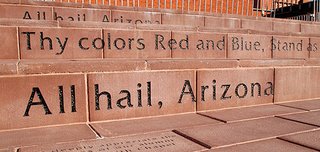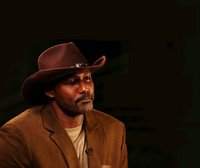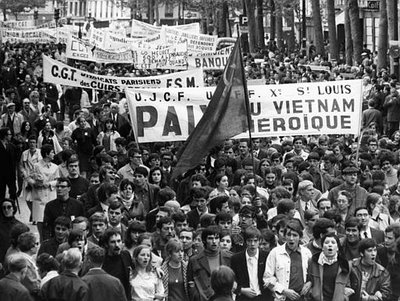Sunday, October 29, 2006 by Jeff
This is the second year in a row that we're stuck with blurry photos of our costumes. How frustrating. Nevertheless, in the name of posterity, I give you Le Petit Prince and a 50s Housewife at a Dinner Party!
 
* No, the cigarette's not real, but the rose is.
And here's our roommate,
Marcus Capone.
 Labels: Halloween
  | » | »
by Jeff
 There's a revolution brewing in Arizona, a revolution that threatens to dismantle the very fabric of our families, communities, and our economy. And if you think it can't happen in your community, watch out. These revolutionaries are on the move!
There's a revolution brewing in Arizona, a revolution that threatens to dismantle the very fabric of our families, communities, and our economy. And if you think it can't happen in your community, watch out. These revolutionaries are on the move!
Extreme liberal agitators have invaded Arizona's political process with a proposition that goes way too far. Now sit down before you read the language of the proposed law. You may start to wonder which planet these people come from.
A person shall not tether or confine any pig during pregnancy or any calf raised for veal, on a farm, for all or the majority of any day, in a manner that prevents such animal from:
- Lying down and fully extending his or her limbs; or
- Turning around freely.
That's right. They want pigs and calves to stretch out and turn around! Clearly, this must not be allowed. Fortunately, the good people with " No on 204" are waging a campaign with the kind of clarity, simplicity, and common sense that this issue deserves. Their advertisements cut right to the heart of the issue:
Why Oppose Prop 204?
1. Unnecessary. Arizona farmers and ranchers are honest/hardworking people that treat animals humanely and provide them a safe and healthy environment.
That's important. Honest/hardworking people have a right to confine their pigs/calves any way they want. In fact, it's in the best interest of those pigs/calves to face forward in the same narrow/metal cage their entire lives. Just how long do you think they would survive in the wild?
2. Foreign Meat. Prop 204 is part of a national political campaign going state-by-state to slowly break down farms and ranches in America.
Ok, this one might be a little confusing. What does "foreign meat" have to do with this state-by-state campaign of terror? What they mean to say - and right they are! - is that as soon as you get American pigs/calves turning and lying around with legs outstretched (they might as well be sipping martinis!), dirty/dark-skinned ranchers from afar are going flood our markets with cheap/foreign meat, and you won't be surprised to know that they raise dirty/dark-skinned meat too!
The state-by-state campaign is a different thing entirely, which brings us to rebuttal number three:
3. Using Arizona. Out-of-state animal rights groups brought Prop. 204 to Arizona just like they did to Florida in 2002.
Just like those rabble-rousing/liberal carpetbaggers forced their anti-slavery and civil rights ideas on Dixie, they're at it again with their wild ideas about the humane treatment of animals. Hogwash. That's the slogan of the No on 204 campaign, and it's dead on. Hogwash. The Humane Society of the U.S. and Farm Santuary, the two biggest contributors to the Prop. 204 campaign, are from Washington, DC and upstate New York, respectively. Ok, sure, our No on 204 campaign receives a major portion of its funding from two Washington, DC-based groups (American Farm Bureau Federation, National Pork Producers Council) but really, that's different. Really. Very different.
The battle over pig stretching in Arizona is not humane for agribusiness. The welfare of animals is Communist propaganda designed to put honest/hardworking corporations out of business. Join me at the polls to vote no on Prop. 204 and yes to animal cruelty. Labels: animal rights, politics
  | » | »
Wednesday, October 25, 2006 by Jeff
[Highly controversial photo
deleted - keep reading]
Diaper Change
© Jeff A. Larson 2006
If you haven't seen my photos on Flickr, goddammit take a look. But if you're curious which of my many eye-catching photos has caught the most eyes, well, it's this one, cleverly titled "Diaper Change."
Diaper Change isn't just inching ahead in popularity of the pack of other equally (if not more) tasty eye candy in my portfolio. It has demolished the competition. In fact, this photo has logged more than 280 hits since it was posted in early August. The next nearest competitor: 17 hits.
What makes this diaper change such a special one? The answer lies in one apparently very influential Flickr fellow, Mom_jesse111. Mom_jesse111 has marked this photo as one of his "favorites." Consequently, when a person views this guy's favorites page - with no pics actually taken by him - they are treated to a fine shot of my sister, her son, and his liberated winkie.
Now, to understand the influence of Mom_jesse111 you might look first at his profile. But you'll find nothing helpful there - it's basically empty. This guy has no personal information here nor any of his own photos. What he does have is an extensive list of "favorites."
But before you click over to that influential list of favorites, which I promise will put an end to any doubts you have about the source of Diaper Change's popularity, first consider some of the Flickr "public groups" Mom_jesse111 has voluntarily joined:
- Accidental Ass Crack
- butt crack
- spanking
- Silly Pictures of People on the Potty
- Hot Bunn Spankings
- Spanking Fun!
- Parents Spanking
- Beautiful Butt
Yes, these are indeed real collections of photos from Flickr members and I leave it to you to learn what constitutes a "silly" picture of people on the potty. Now, as promised, here are the favorites of Mom_jesse111.
No really, take a look.
Now someone tell me, should I be worried about this? Labels: Flickr
  | » | »
Monday, October 23, 2006 by Jeff
A video courtesy of my dad. Thanks, Dad. Labels: humor
  | » | »
Tuesday, October 17, 2006 by Jeff
 I live in a feudal kingdom. Just outside the main city walls, actually. Prince Bob who runs the place is new in town and you really never hear from the guy. He's a rarely seen figure who works in the castle, makes decisions on high, and collects taxes from us semi-annually. The aristocracy is a benevolent bunch who, once they demonstrate their merit to the Prince, are guaranteed jobs for life. The clergy and guilds are as close to the city as can be without being within its walls, and frankly I wish they were farther away.
I live in a feudal kingdom. Just outside the main city walls, actually. Prince Bob who runs the place is new in town and you really never hear from the guy. He's a rarely seen figure who works in the castle, makes decisions on high, and collects taxes from us semi-annually. The aristocracy is a benevolent bunch who, once they demonstrate their merit to the Prince, are guaranteed jobs for life. The clergy and guilds are as close to the city as can be without being within its walls, and frankly I wish they were farther away.
We all work in exchange for the many amenities provided to us. Our city has it's own hospital, police department, recycling plant, and movie theater. We have all kinds of entertainment, including a pool hall, competitive sports teams, a planetarium, dining, shopping, swimming, and coffeehouses. You can ride free shuttles around town. The only thing we really lack is a fresh food market. You have to travel to the outskirts to find that. Otherwise, we have everything we need.
I have a place just outside the city walls in the Workers' Quarter, adjacent to the Main Gate. It's really prime real estate, as far as I'm concerned, because I can walk to my office in the city but escape it each night. Don't get me wrong, the city's a nice place - quiet, clean, and loaded with friendly people - but some things you just can't find inside Univer City. For example, poor people, high crime rates, and alcohol. Advertisements used to be rare here too, but times certainly are changing. Fortunately, there's plenty of these things within walking distance of the city.
If you still haven't made vacation plans this year, consider visiting Univer City. Contact our department of tourism for more information. Labels: university
  | » | »
Tuesday, October 10, 2006 by Jeff
 Most striking when I arrived in Utah as a 7 year-old was the two-thirds of the state that is Mormon. We were clearly outnumbered. But we missed something even more striking. 94% of the state was white. For the next 14 years I grew up in this land of white bread, white collars, and white skin. Most striking when I arrived in Utah as a 7 year-old was the two-thirds of the state that is Mormon. We were clearly outnumbered. But we missed something even more striking. 94% of the state was white. For the next 14 years I grew up in this land of white bread, white collars, and white skin.
So you might understand why a 6-foot-9 black truck-driving cowboy stood out to a kid. Karl Malone wasn't just an all-star forward for the Utah Jazz, he was also a self-dubbed "African-American redneck." Born in northern Louisiana, not far from Arkansas where he now owns a 180-acre cattle ranch, "The Mailman" is the only black cowboy I'd ever known. Turns out, he's far from alone.
According to an eye-catching story in the Times today there are black cowboys riding the roads of Queens, NY. The story piqued my interest enough to do some digging. Once I found "the premiere black cowboys site on the Internet" I realized how much I've been missing.
Estimates of the antebellum cowboy population in the U.S. (warning: numbers of Internet origin) put African-American men at about 5,000-8,000, or roughly one quarter of all cowboys riding the trails at that time. Many learned herding, roping, and riding skills as slaves working on Southern ranches; others had been Buffalo Soldiers or Black Seminole scouts in the U.S. army who settled their own land in the south and west. There seems to be some agreement that as brutally difficult and demanding as cowboy life was, it beat slavery. They did have an impetus.
Did you know there's a Black American West Museum in Denver, a National Cowboys of Color Museum in Ft. Worth, and books and books and books on the subject? Check out this National Geographic gallery.
I even learned something about Utah. Moab, a town not known for its cowboys of color, was actually settled by two guys, one a French-Canadian and the other a black cowboy by the name of William Granstaff. Utah lore recalls these two by the nicknames given them by their neighbors, "Frenchie" and "Nigger Bill" (clever folks back then). Bill was eventually run out of town for bootlegging liquor to the Ute indians but later honored as the namesake of the canyon where he grazed his cattle - that's right: "Nigger Bill Canyon." At some point in the intervening years someone had the sense to update the name - "Negro Bill Canyon" - which is purported be a lovely little hike today.
Still, after several hours researching this (hours that I'll never get back, mind you), I'm still a bit miffed. What the hell are they doing riding horses in Queens, NY? Labels: cowboys, The West
  | » | »
Friday, October 06, 2006 by Jeff
 If you listen to people who study social movements there is little doubt about where protesters stand in relation to existing institutions: If you listen to people who study social movements there is little doubt about where protesters stand in relation to existing institutions:
"...contentious politics organizes on the boundaries of institutions and is never truly accepted by institutional elites." (Tarrow 1998: 67)
In fact, they all agree. Social movements are not institutionalized. Indeed, that's precisely why regular people use them:
Collective action becomes contentious when it is used by people who lack regular access to institutions...Contentious collective action is the basis of social movements...because it is the main and often the only recourse that ordinary people possess against better-equipped opponents or powerful states." (Tarrow 1998: 3)
Study after study shows social movements at their most powerful when they disrupt the daily routines of institutions, and it is when they lose their disruptive edge that they run the risk of being "absorbed and institutionalized into ordinary politics" (Tarrow 1998: 9). This is when they start acting more like an interest group, a lobby, or a political party.*
The paradox of social movements then lies in their remarkable persistence. This purportedly non-institutionalized form has hardly changed in roughly 200 years. When 19th century campaigners for parliamentary reform hit the streets they did pretty much the same things that 21st century immigration activists do: picket, demonstrate, march, boycott, petition, strike, form organizations, solicit media attention. Certainly these organized campaigns seek to influence existing institutions, but why stick with such (dare I say) antiquated techniques? Put differently, why is there "such startling homgeneity of organizational forms and practices" (DiMaggio & Powell 1991: 64)?
* It must be said that social movement scholars are guilty of a longstanding bias favoring movements oriented toward politics and the state. So when they talk about institutions they really mean the polity, and in that context social movements most certainly are marginal actors. Labels: social movements, sociology
  | » | »
|
 Jeff A. Larson
Jeff A. Larson
Sociologist, Arizona.
- | October 30, 2006 12:04 PM
- | November 01, 2006 11:29 AM
- Jeff | November 01, 2006 11:51 AM
- | November 01, 2006 8:12 AM
- | November 06, 2006 4:58 PM
- | November 16, 2009 6:15 PM
- | April 22, 2010 8:00 AM
- joanna | October 26, 2006 9:04 PM
- Jeff | October 26, 2006 11:21 PM
- joanna | October 27, 2006 10:24 AM
- Drek | October 18, 2006 12:54 PM
- | October 18, 2006 5:07 PM
- Jeff | October 19, 2006 1:46 PM
- The Alt Martha | October 22, 2006 2:20 PM
- erica | October 23, 2006 11:53 AM
- joanna | October 10, 2006 8:55 PM
- | October 17, 2006 9:05 PM
- The Alt Martha | October 22, 2006 2:17 PM
|












